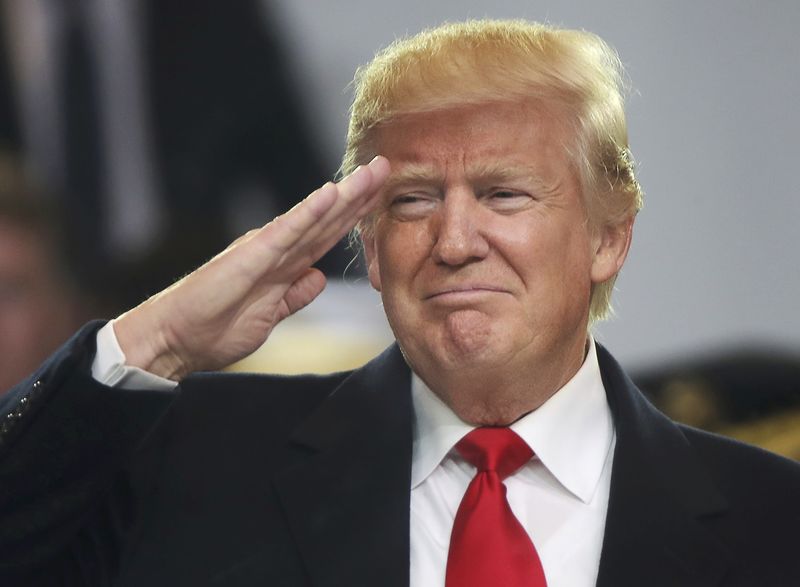By Melissa Fares and Dustin Volz
WASHINGTON (Reuters) - The pomp and circumstance were like any big Washington celebration: a regal backdrop, the patriotic music, the military precision of the ceremony.
But the throngs who attended Friday’s inauguration of U.S. President Donald Trump came for change. Dramatic change.
Some came to hear about changes in America’s world view or a desire for stronger borders. Some wanted to hear how change would ripple into their hometown. Some hankered for u-turns in policies; some wanted an entirely new approach to governing.
Trump, like President Barack Obama in 2008, tapped into a desire for change and cast himself as a challenger to the Washington establishment. But, this time, the demands came from a slice of America that feels neglected during the Obama administration.
"Obama’s had eight years and I can see my neighbors in worse shape than they were eight years ago," said Carol Reiller, 66, a retiree who drove seven-plus hours from Buffalo, New York, with her grandchildren to see the swearing-in ceremony.
Many of the inauguration attendees were focused on economic issues. In dozens of interviews with supporters, they pinned their hopes and expectations on everything from job creation to improved border security to a revival of American manufacturing.
Christian Early, 37, said many of his friends have lost work in the construction industry and he is looking for Trump to turn that around.
He wants quick approval of the proposed Keystone XL crude oil pipeline from Canada through the United States, pressure on U.S. companies to repatriate cash in offshore tax havens, and an immediate loosening of financial regulations.
“If he does those things, he will be creating jobs,” said Early, a bank officer from Annapolis, Maryland. “If he’s not making an earnest effort within one year, he’ll just be another politician.”
Like thousands in the crowd, Early wore one of Trump’s signature “Make America great Again” baseball caps, a bright red sign of solidarity in an audience overwhelmingly opposed to just about everything symbolized by the city they had come to visit.
For his part, Trump's inaugural address channeled the resentment of the white working class in an echo of his fiery campaign speeches, darkly portraying a dysfunctional country riven by unemployment, poverty and crime that he would change in a movement of nationalism and trade protectionism.
'SHAKING THINGS UP'
George Weber, 51, a car dealer who traveled from Missouri, said he voted for Trump with the hope that he will get Washington “working for the people…. I want to see him shaking things up right away.”
Even veterans of previous inaugurations felt the mood this time was different.
Marie Quinn, 76, from Richmond, Virginia, said she'd attended Republican inaugurations since Ronald Reagan's presidency, but felt this one promised to bring more historic change. "This one will probably be much bigger," she said, predicting that Trump would put the country on a new course.
Many attendees said they were eager for Trump to fulfill his promises of a crackdown on illegal immigration.
Joshua Rojas, 25, a Mexican-American graduate student who worked as a bank teller to fund his trip, said he understood some of the immigrant community’s concern about Trump, since his own father, a minister, was brought to America as an illegal immigrant.
“Trump isn't popular among Hispanics and sometimes he takes it a little far, but what he's saying he will do still excites me,” Rojas said. “Illegal immigration is a big burden to local government.”
Not everyone who attended the ceremonies was keen on the change Trump is promising.
Lani Lutar, 39, a small business owner from San Diego, came for the Women’s March on Washington, an event scheduled for Saturday and expected to draw large crowds. She supported neither Trump nor his opponent, former Secretary of State Hillary Clinton, but she got an inaugural ticket from her congressman’s office.
Lutar wanted to “appreciate the significance of this amazing ceremony of the best country in the world.” But even the impressive pageantry did not erase her misgivings about Trump.
“I worry a lot about a lot of things, his treatment of people of different religions, of women, his racist comments, there’s a lot," she said.
Some of Trump’s supporters echoed those concerns, talking hopefully about the need to unify a nation bitterly divided by a combative and controversial campaign.
Francie Keener, 37, wearing a lipstick-red dress to match the ubiquitous Trump cap, thought the new president's speech was a good start. It showed that "he supports everybody," the New Yorker said. "I hope people can rest a little easy now."
Susan Suhovsky, 64, a Catholic school teacher from New York, suggested, however, that Trump still has a way to go in softening his often combative rhetoric.

“I hope when he speaks, he cleans up how he talks,” she said. “That is a concern, because you represent our country…. He talks like a New Yorker.”